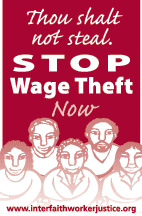 Low-wage workers and community supporters gathered in more than forty cities across the U.S. on Thursday to condemn wage theft, the illegal underpayment or non-payment of wages. The National Day of Action to Stop Wage Theft was organized by Interfaith Worker Justice, a national alliance. Wage theft is a national crime wave that robs millions of workers of billions of dollars.
Low-wage workers and community supporters gathered in more than forty cities across the U.S. on Thursday to condemn wage theft, the illegal underpayment or non-payment of wages. The National Day of Action to Stop Wage Theft was organized by Interfaith Worker Justice, a national alliance. Wage theft is a national crime wave that robs millions of workers of billions of dollars.
Low-wage workers in New York City, Chicago, and Los Angeles were cheated of an average $51 a week, according to a recent report co-authored by several universities, entitled, “Broken Laws, Unprotected Workers: Violations of Employment and Labor Laws in America’s Cities.” Among the workers surveyed, 1 in 4 were paid less than the legally-required minimum wage, and 3 out of 4 who worked overtime hours were not paid the legally-required overtime.
Employers were creative in stealing wages: promising higher wages but paying only the minimum, paying less than minimum wage, not paying for all hours worked, misclassifying workers as exempt from overtime pay, deducting equipment or transportation “fees” from paychecks, stealing tips, misclassifying workers as independent contractors, or simply not paying workers at all.
In July, Rep. George Miller (D-CA) introduced the Wage Theft Prevention Act (H.R. 3303), which begins the statute of limitations from the date the employer is notified instead of the date of the theft. Under current law, delays result in permanent loss of back pay. Legislation is also moving at the state-level. In Ohio this week, State Senator Morano introduced the Wage Protection Act, empowering the state commerce department to investigate more complaints.
But advocacy for workers happens at the day-to-day level by affiliates of the national Interfaith Worker Justice, such as the Cincinnati Interfaith Workers’ Center, which canvassed yesterday across the city to reach low-income workers. Since 2005, the small organization has taken over 500 wage theft reports and helped recover over $500,000 in unpaid wages. The Cincinnati group aims to empower workers to challenge dangerous working conditions and educate workers about how to defend their rights, including the rights of immigrants.
“I had to make decisions on whether to pay rent or buy food,” said Cincinnati resident Frazier Kidd, who explained his struggle after being cheated of promised wages. “Thou shalt not steal,” said Kim Bobo, Director of the national Interfaith Worker Justice. “It’s a pretty straightforward message.”
